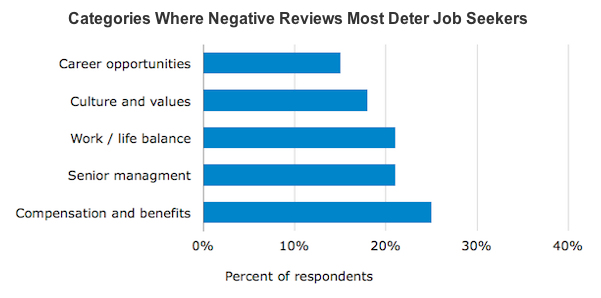When Others Talk About Your Company and Compensation Online
Jobseekers on Glassdoor review compensation/benefits and former employee commentary, to get the goods on prospective employers
Once upon a time in a downtown boardroom in January, business executives discussed closely-guarded, proprietary HR policies.
Fast forward to 2014, and businesses are now using social media to virtually welcome prospective employees into those boardrooms – to be a fly on the wall, and get a taste of daily life from the inside.
Indeed, transparency (warts and all) will be a big word in 2014 in the talent attraction world, and organizations that don’t “share” like their competitors, will fall off the radar among the best talent out there.
In fact, everyday workers across a wide range of industries are already sharing their salaries and insights with fellow members of the job search community, so companies today have to either keep up or give up.
 |
| A new study by Software Advice asked 4,633 job seekers: “When checking a company’s Glassdoor ratings, what would most impact your decision NOT to apply to a company?” Their responses are summarized above. |
Software Advice, a company that reviews HR software, just released a U.S. study where they polled 4,633 job seekers. They found almost half of all respondents consult the popular website Glassdoor to research compensation and benefits, and to read current and former employee commentary at some point in their job search.
So, what are the implications of this on company confidentiality, and countering competitor activity?
Erin Osterhaus, HR analyst from Software Advice who was behind this study says, “Companies should make sure they have a profile on Glassdoor.com, and then they should ask employees to write reviews on the site.”
Osterhaus also notes that the study discovered fresh reviews (less than 6 months) have the greatest impact on company perceptions. “So, it’s important to continue updating reviews from time to time to stay relevant,” she explains.
Beyond the Glassdoor website however, some organizational preparedness is necessary to truly thrive in this new transparent talent attraction arena. Here are five tips to get you started:
Have a clear social media policy
Ensure each employee reads your social media policy and then signs it to say they will abide by it. This policy should have a clear balance between encouraging employees to share the company’s brand with others, defining appropriate conduct as a company ambassador, and being able to keep proprietary, confidential or sensitive information off of social discussions. Here is a helpful Canadian article that also offers a legal lens to this discussion.
Foster a culture of sharing to create authentic ambassadors
The strongest employer brands are built when workers authentically and proactively share their passion for their work. While this genuine communications can’t be manufactured, it can be cultivated. Like planting a seed and making sure the environment is conducive to growing, companies need to empower employees to become ambassadors on their own.
Raise the social profile of your C-suites
Reading a commentary here and there from a disgruntled ex-employee may leave a somewhat negative impression, but consistent, authentic and open communications from a company’s CEO can leave a much bigger positive impression. In a transparent world, we can neutralize negatives by adding in more positives.
Become fans of your competitors
Taking inspiration from that famous saying, “Keep your friends close, and your enemies closer,” in today’s world, it’s important to “friend” your competitors, so you can counter their activities. Today, grocery stores accept coupons from any competing retailer, and to stay competitive, HR and hiring managers must keep their pulse on industry offers in the same way.
Walk the talk
When it comes to salaries and benefits, growth opportunities, work-life balance and other important factors for employees, companies that deliver and then share the fact that they deliver, will be the ones to come out on top.










